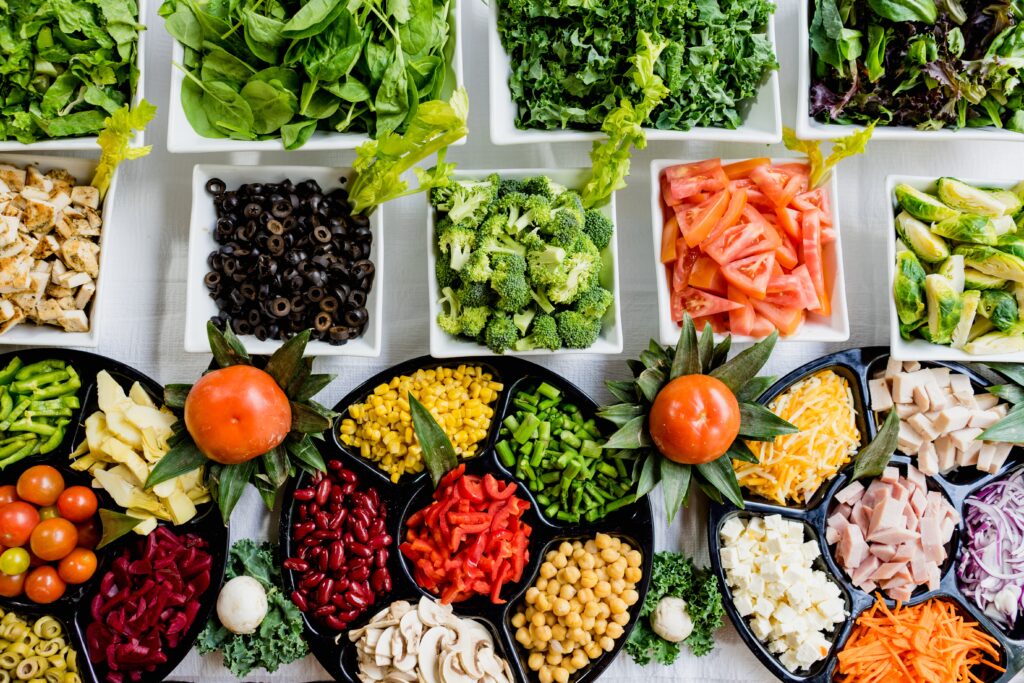Table of Contents

How Your Diet Can Impact Your English Language Proficiency
Did you know that the food you eat can have a profound impact on your ability to learn and speak English? It may seem surprising, but research has shown that there is a strong connection between diet and brain function. By incorporating certain foods into your diet, you can boost your cognitive abilities and improve your language skills faster. In this blog post, we will explore the link between diet and language proficiency, as well as provide tips for incorporating a brain-boosting diet into your daily routine.

The Connection Between Diet and Brain Function
The foods we consume can have a significant impact on our brain function. Certain nutrients, such as omega-3 fatty acids and antioxidants, support optimal brain health and cognitive function. Including these nutrients in your diet can help enhance your English language proficiency.
Including key nutrients like omega-3 fatty acids and antioxidants in your diet can enhance brain function and improve English language proficiency. Avoiding foods high in saturated fats and processed sugars is crucial for maintaining good cognitive health. Prioritizing nutrient-rich options such as fruits, vegetables, whole grains, and lean proteins promotes better brain health. Incorporating elements from dietary approaches like the DASH diet can provide an additional boost to your cognitive abilities.
On the other hand, there are certain foods that should be avoided to maintain good brain health. Diets high in saturated fats and processed sugars have been linked to impaired cognitive function. Counting calories may not be as important as focusing on the quality of food you consume for improved brain function.
By following dietary guidelines that emphasize nutrient-rich foods like fruits, vegetables, whole grains, and lean proteins while avoiding unhealthy options like fried or sugary snacks, you can promote better brain health and enhance your English language skills. Consider incorporating elements from dietary approaches like the DASH diet for an added boost to your cognitive abilities.

Nutrients that Support Brain Health
Omega-3 fatty acids, B vitamins, and antioxidants are essential nutrients that support brain health. Omega-3 fatty acids can improve cognitive function and reduce the risk of mental decline. B vitamins help in maintaining healthy brain cells and neurotransmitters while antioxidants protect against oxidative stress in the brain. Including these nutrients in your diet can contribute to improved brain health and overall well-being without having to count calories or follow strict dietary guidelines.
Foods to Include in Your Diet

Fish like salmon and sardines are excellent additions to your diet. They are high in omega-3 fatty acids, which promote brain health and can improve your language skills. Leafy green vegetables should also be included in your meals as they are packed with vitamins and minerals that support overall cognitive function. Whole grains, such as brown rice and quinoa, provide sustained energy without the need for counting calories, making them a healthy choice for boosting brain power.
Foods to Avoid
Processed foods high in sugar and unhealthy fats can wreak havoc on your health. These calorie-dense, nutrient-poor options not only contribute to weight gain, but they also have a negative impact on your overall well-being. Artificial sweeteners and additives found in many processed foods may seem like a healthier alternative, but they can disrupt your body’s natural processes and lead to various health issues. Additionally, excessive caffeine intake should be avoided as it can interfere with sleep patterns and cause restlessness or anxiety. By steering clear of these detrimental choices, you’ll be taking an important step towards improving both your physical health and English language proficiency.
The Impact of Diet on Cognitive Abilities
Improving Memory and Focus: A healthy diet plays a crucial role in enhancing memory and focus. Nutrient-rich foods, such as fruits, vegetables, and whole grains, provide the necessary vitamins and minerals that support brain function. By incorporating these foods into your diet, you can optimize cognitive abilities like memory retention and concentration.
Enhancing Language Learning: The impact of diet on language learning should not be underestimated. Certain nutrients have been found to promote brain health and improve linguistic skills. Omega-3 fatty acids found in fish oil, for example, are known to enhance cognitive functions related to language acquisition. Including sources of omega-3s in your diet can therefore facilitate the process of improving English language proficiency.
Improving Memory and Focus
Brain-boosting foods provide essential nutrients that support memory and focus. Incorporating fruits like blueberries, which are rich in antioxidants, can improve cognitive function. Additionally, consuming omega-3 fatty acids found in fish and nuts can enhance brain health by reducing inflammation.
Antioxidants play a crucial role in cognitive function. Foods such as dark chocolate and green tea contain antioxidants that protect the brain from oxidative stress. Including these foods in your diet can help maintain optimal mental clarity and improve memory retention.
By making mindful choices about what we eat, we can nourish our brains with nutrients that support memory and focus. Including brain-boosting foods, omega-3 fatty acids, and antioxidants in our diets will promote cognitive function for enhanced language learning proficiency.

Enhancing Language Learning
In order to enhance language learning and improve English proficiency, it is important to pay attention to the nutrients that support neuroplasticity, the role of hydration, and the impact of protein on language development. By incorporating these elements into your diet, you can optimize your brain function and accelerate your language learning journey.
- Nutrients for Neuroplasticity: Certain nutrients like omega-3 fatty acids, vitamins B6 and B12, and antioxidants have been linked to improved cognitive function and enhanced memory. Including foods rich in these nutrients such as fish, eggs, leafy greens, berries, and nuts can promote neuroplasticitya crucial process in language acquisition.
- Importance of Hydration: Staying adequately hydrated is essential for optimal brain performance. Dehydration can lead to fatigue, decreased focus, and poor cognitive functioning. To maintain peak mental performance during language learning sessions or practice exercises throughout the day drink plenty of water or other hydrating beverages.
- The Role of Protein in Language Development: Protein plays a vital role in various aspects of brain development including cognition and communication skills. Consuming high-quality sources of protein such as lean meats (chicken or turkey), legumes (beans or lentils), dairy products (milk or yogurt), tofu or tempeh will provide the necessary building blocks for effective language development.
By nourishing both your body and mind with a nutrient-rich diet that supports neuroplasticity through specific foods rich in omega-3 fatty acids vitamin B6/B12 & antioxidants , staying well-hydrated throughout your day ensuring adequate intake levels are maintained avoiding dehydration& recognizing how important proteins are within our diets when it comes down specifically towards enhancing our minds capabilities we’re taking an active step toward improving our overall English fluency
Tips for Incorporating a Brain-Boosting Diet
Meal planning and preparation is key to incorporating a brain-boosting diet. By taking the time to plan your meals in advance, you can ensure that you are providing your brain with the nutrients it needs to function at its best. Additionally, preparing your own meals allows you to have control over the ingredients and portion sizes, making it easier to make healthy choices.
Incorporating healthy snacks into your daily routine is another effective way to boost brain power. Instead of reaching for sugary or processed snacks, opt for nutritious options such as fruits, vegetables, nuts, and seeds. These snacks provide essential vitamins and minerals that support cognitive function and help improve language skills.
Staying hydrated is crucial for optimal brain function. Dehydration can lead to fatigue, difficulty concentrating, and decreased mental clarity – all of which can hinder language learning progress. Make sure to drink plenty of water throughout the day and limit consumption of sugary drinks that can cause energy crashes.
By following these tips for incorporating a brain-boosting diet through meal planning and preparation, choosing healthy snack options, and staying hydrated; English learners will optimize their language skills improvement journey by enhancing their overall cognitive abilities naturally!
Meal Planning and Preparation
Power-packed breakfast ideas are a key component of effective meal planning and preparation. Start your day with nutrient-rich foods like overnight oats topped with fresh fruits, or a protein-packed smoothie bowl loaded with spinach and chia seeds. These options provide the energy you need to kick-start your day while improving mental focus.
When it comes to lunch options that promote concentration, consider incorporating whole grains, lean proteins, and healthy fats into your meals. For example, a quinoa salad with grilled chicken and avocado provides a satisfying combination of nutrients that support brain function. By choosing balanced lunch options like these, you can enhance cognitive performance throughout the afternoon.
For dinner recipes that boost mental clarity in the evening hours, prioritize ingredients such as fatty fish rich in omega-3s or leafy greens packed with antioxidants. Try making salmon fillets seasoned with herbs served alongside roasted vegetables for a nourishing yet delicious meal option. By selecting dinner recipes focused on brain health, you can optimize your language learning abilities during nighttime study sessions
Healthy Snack Options
Fruit and nut combinations provide sustained energy throughout the day. Pairing fruits like apples, bananas, or berries with nuts such as almonds or walnuts not only satisfies your hunger but also keeps you focused and energized.
- Apple slices with almond butter
- Banana and walnut smoothie
- Berry mix topped with crushed almonds
Vegetable-based snacks are great for improving cognitive function. Carrot sticks, cucumber slices, or bell pepper strips can be enjoyed on their own or dipped in hummus for added flavor and nutrients.
- Carrot sticks with hummus
- Cucumber slices with Greek yogurt dip
- Bell pepper strips with guacamole
Protein-rich snacks are ideal for enhancing focus during language learning sessions. Options like hard-boiled eggs, Greek yogurt, or edamame provide a good source of protein to keep your brain sharp.
- Hard-boiled egg salad on whole grain crackers
- Greek yogurt parfait with mixed nuts and berries
- Steamed edamame sprinkled with sea salt
Staying Hydrated
The importance of water intake in language learning cannot be overstated. Staying hydrated is crucial for optimal brain function, and when it comes to language acquisition, a well-hydrated brain can absorb and retain information more effectively. So make sure you always have a bottle of water within reach while studying or practicing your English skills.
Looking for a refreshing way to boost your brainpower? Try ‘brain-boosting’ infused water recipes! Infusing water with fruits like blueberries and oranges not only adds flavor but also provides essential vitamins that support cognitive function. Get creative with different combinations like cucumber and mint or lemon and ginger to keep yourself engaged and hydrated during your language learning sessions.
In addition to drinking enough fluids, there are other hydration tips that can help you stay mentally sharp. Start by setting reminders throughout the day to drink water regularly, as it’s easy to forget when focusing on tasks. Opt for herbal teas or fresh fruit juices as alternatives if plain water becomes monotonous. And don’t forget about hydrating foods like cucumbers, melons, and tomatoes – they provide an extra source of hydration while adding variety to your diet.
Remember: staying hydrated isn’t just important for physical health; it has significant benefits for mental clarity too! So prioritize regular fluid intake along with these ‘brain-boosting’ infused waters and hydration tips in order to fuel your language proficiency journey effectively.
10 Tips to Help You Learn English Quickly


